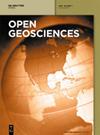Effective reservoir identification and sweet spot prediction in Chang 8 Member tight oil reservoirs in Huanjiang area, Ordos Basin
IF 1.7
4区 地球科学
Q3 GEOSCIENCES, MULTIDISCIPLINARY
引用次数: 0
Abstract
The Chang 8 reservoir of the Huanjiang Oilfield in the Ordos Basin is a tight sandstone reservoir with poor reservoir physical properties and uneven oil distribution. In this study, the effective reservoirs developed on a large scale under the condition of horizontal well volume fracturing technology of the Chang 8 Member was identified based on the data of core observation, experimental analysis, logging, oil test, and production dynamics, and the identification standard of effective reservoirs in terms of reservoir physical properties, oil content, and comprehensive logging characteristics of gas logging was established. This scheme allows for a thorough identification of the effective reservoirs for horizontal well development in tight sandstone reservoirs. The findings indicate that the study area’s tight oil resources can be successfully produced. The well logging results show that the oil-bearing property of sand bodies with oil stains is better than that of oil spots. The bottom limit of the acoustic wave time difference is 210 μs/m, the permeability is 0.03 mD, the porosity is 6.0%, the rock resistivity is 30 Ω m, and the total hydrocarbon gas measurement value exceeds five times the baseline. At the same time, the total oil thickness is greater than 6 m, and the thickness of a single sand body is above 4 m. We have defined the lower limit standard of high-efficiency reservoir of Chang 8 tight oil in L289 block of Huanjiang oilfield. According to the analysis of oil-bearing property, comprehensive logging display, and reservoir thickness, the geological “sweet spots” is optimized to provide reference for subsequent mining. Through comparative analysis, the rules and trends are found to provide a basis for selecting mining strategies. With the help of technical means such as numerical simulation and geological modeling, the prediction accuracy and decision-making effect are improved. By clarifying the lower limit standard of reservoir, optimizing geological “sweet spots” and avoiding risk areas, the mining efficiency is improved and the cost is reduced, which provides reference for similar oilfield development.鄂尔多斯盆地环江地区长8系致密油藏的有效储层识别与甜点预测
鄂尔多斯盆地环江油田长8油藏属于致密砂岩油藏,油藏物性差,油层分布不均。本研究根据岩心观测、实验分析、测井、试油、生产动态等资料,对长8成员水平井体积压裂技术条件下大规模开发的有效储层进行了识别,从储层物性、含油率、气测井综合测井特征等方面建立了有效储层识别标准。通过这一方案,可以彻底确定致密砂岩储层水平井开发的有效储层。研究结果表明,研究区域的致密油资源可以成功开采。测井结果表明,油污砂体的含油性能优于油点。声波时差底限为 210 μs/m,渗透率为 0.03 mD,孔隙度为 6.0%,岩石电阻率为 30 Ω m,总烃气测量值超过基线的 5 倍。同时,油层总厚度大于 6 米,单砂体厚度大于 4 米,确定了环江油田 L289 区块长 8 致密油高效储层下限标准。根据含油性质、综合测井显示、储层厚度等分析,优化地质 "甜点",为后续开采提供参考。通过对比分析,找出规律和趋势,为选择开采策略提供依据。借助数值模拟、地质建模等技术手段,提高预测精度和决策效果。通过明确储层下限标准,优化地质 "甜点",避开风险区域,提高了开采效率,降低了成本,为类似油田开发提供了参考。
本文章由计算机程序翻译,如有差异,请以英文原文为准。
求助全文
约1分钟内获得全文
求助全文
来源期刊

Open Geosciences
GEOSCIENCES, MULTIDISCIPLINARY-
CiteScore
3.10
自引率
10.00%
发文量
63
审稿时长
15 weeks
期刊介绍:
Open Geosciences (formerly Central European Journal of Geosciences - CEJG) is an open access, peer-reviewed journal publishing original research results from all fields of Earth Sciences such as: Atmospheric Sciences, Geology, Geophysics, Geography, Oceanography and Hydrology, Glaciology, Speleology, Volcanology, Soil Science, Palaeoecology, Geotourism, Geoinformatics, Geostatistics.
 求助内容:
求助内容: 应助结果提醒方式:
应助结果提醒方式:


